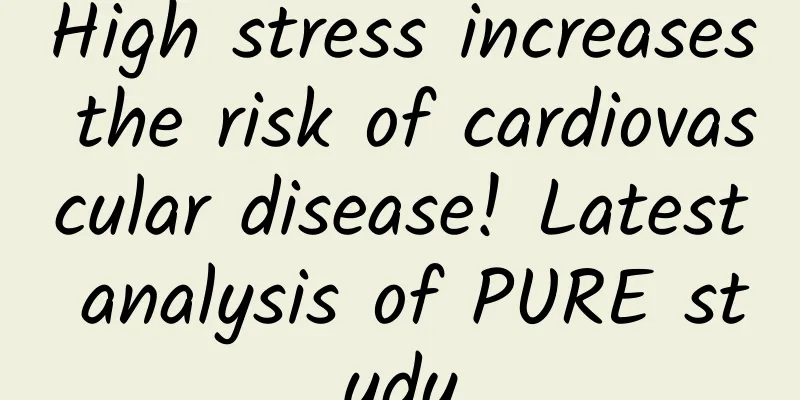High stress increases the risk of cardiovascular disease! Latest analysis of PURE study

|
A recent analysis of the Prospective Urban and Rural Epidemiology (PURE) study found that the risk of cardiovascular disease events is significantly increased under severe stress. The study included 118,000 residents in 21 countries, including five low-income countries, 12 middle-income countries and four high-income countries. In the study, residents under heavy stress were slightly younger and more likely to have risk factors such as smoking or abdominal obesity, which are more common in high-income countries. The median follow-up was 10 years, during which 5934 cardiovascular events occurred, including myocardial infarction, stroke, or heart failure. After adjustment, the researchers found that severely stressed residents had a 22% increased risk of cardiovascular events and a 30% increased risk of stroke, while mildly and moderately stressed residents had no increased risk. Previous studies by the same research group found that people who perceived themselves to be under great stress had a 1.45 times higher risk of acute myocardial infarction, while those who were under long-term stress at work had a 2.17 times higher risk of myocardial infarction. Lin Shuguang and others also pointed out in their review article in this journal that negative life events are clearly related to cardiovascular disease. Negative life events stimulate emotions and activate the sympathetic nervous system, which leads to increased heart rate, increased blood pressure, and vasoconstriction, causing an imbalance between oxygen demand and supply in the coronary arteries and heart that already have lesions, leading to myocardial infarction. The study divided the stress felt by residents in the past year into three aspects: psychosocial stress, life events, and economic stress. Psychosocial stress is defined as irritability, anxiety, or difficulty sleeping due to work or family conditions. Unemployment, retirement, business failure, divorce, death of spouse/close relative, or major illness are life events; the level of economic stress is obtained by investigating whether financial stress has been felt in the past 12 months; the overall stress level ranges from zero (no stress) to level three (severe stress). Among them, 7.3% reported severe stress, 18.4% moderate stress, and 29.4% mild stress. Source: China Circulation Magazine |
<<: What are the main gases that cause acid rain? How to control acid rain
>>: Is talking less a sign of autism?
Recommend
What to do if pregnant women have sensitive uterus
After a woman becomes pregnant, her body will und...
What is the reason for the black color of the period?
After the menstrual period comes, if you find tha...
Small particles on the labia
Under normal circumstances, small particles will ...
Treatment of abnormal leucorrhea, different causes and treatment methods are also different
Whether the leucorrhea is normal is a health sign...
Is it difficult to get pregnant with a cold uterus?
For women, the term "uterine cold" is n...
A one-month-old baby died while swimming with a collar on. This article explains why doctors do not recommend collars for babies.
Real points: Neck collars are not safe swimming g...
There are seven "musts" for health preservation before and after the beginning of spring. Every word is a hard truth! Learning is a profit~
The beginning of spring is coming soon. Once it p...
What is the cause of sticky menstrual blood?
Women's bodies are particularly weak during t...
What is the cause of seborrheic dermatitis on the scalp of girls?
Some girls find that they have more dandruff when...
How did Huang Zhong die in the Romance of the Three Kingdoms? How did Yan Yan die in the Romance of the Three Kingdoms?
The Romance of the Three Kingdoms uses characters...
How to peel chestnuts more conveniently? Tips for peeling chestnuts
We all know that chestnuts are a common delicacy....
How long can a pregnant woman brush her teeth?
Many elderly people say that you cannot brush you...
What to do if your wife spends money lavishly? How to deal with conflicts caused by different consumption concepts between husband and wife?
Many couples discover that they have different co...
The older you get, the more forgetful you become. This is actually because your brain is constantly improving.
Many people think that forgetting is not a good t...
Can the folds of the vaginal wall contain bacteria?
Vaginal wall folds are a normal structure of fema...









